Posts by Christopher Lochhead
396 You Need a Dream, Not a Deck: Zero Billion Dollar Markets with Steve Vassallo
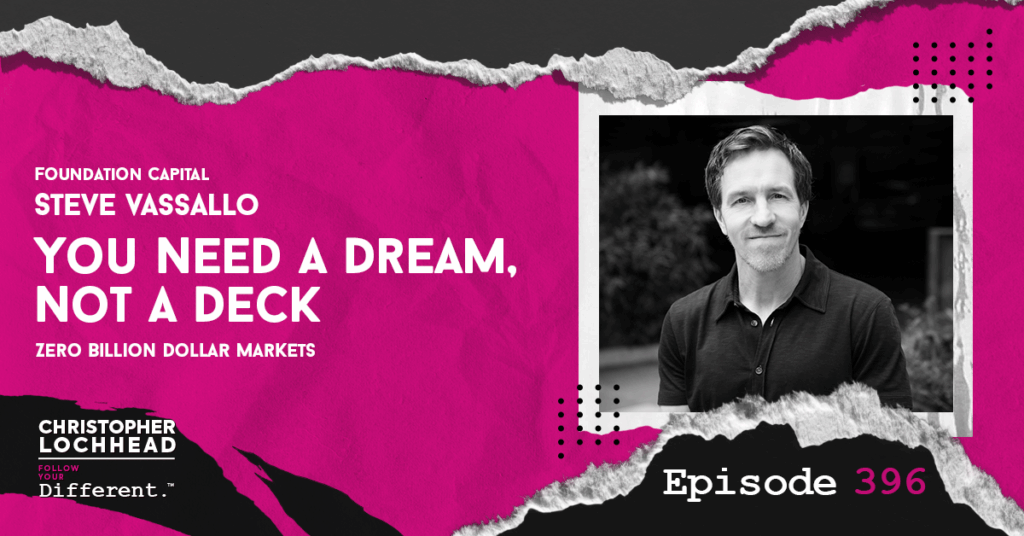
Podcast: Play in new window | Download (Duration: 1:01:52 — 42.5MB) | Embed
Subscribe: Apple Podcasts | Spotify | Pandora | RSS | More
On this episode of Christopher Lochhead: Follow Your Different, we have a dialogue with Steve Vassallo, a General Partner at Foundation Capital, to celebrate the firm’s 30th anniversary and explore the evolution of venture capital (VC) in Silicon Valley.
We discuss the shift of many traditional VC firms from early-stage investments to a more asset management-oriented approach. Steve Vassallo talks about the importance of maintaining a craft-oriented, personalized approach to VC, focusing on product excellence and effective distribution. He also highlights the current trends in AI and blockchain, urging founders to prioritize innovation and core product differentiation in a rapidly changing market.
With nearly 18 years at Foundation Capital, Steve shares his unique insights into the changing landscape of venture capital, the importance of maintaining a craft-oriented approach, and the challenges faced by early-stage founders.
You’re listening to Christopher Lochhead: Follow Your Different. We are the real dialogue podcast for people with a different mind. So get your mind in a different place, and hey ho, let’s go.
Celebrating 30 Years of Foundation Capital
Foundation Capital recently marked its 30th anniversary, a significant milestone in its journey. The firm has launched its 11th fund, a $600 million vehicle aimed at supporting extraordinary founders at the earliest stages of their ventures, particularly in the enterprise sector.
Steve Vassallo adds that more than half of their investments focus on early-stage companies, including seed and Series A rounds, with a strong emphasis on technology, particularly in fintech and crypto.
Steve Vassallo on the Changing VC Landscape
Christopher and Steve Vassallo then discuss the evolution of VC firms, noting that many traditional firms have transformed into asset managers rather than remaining true venture capitalists. Steve points out that the percentage of capital raised by these firms for early-stage investments has dwindled significantly. He estimates that only about 20% of the capital raised by these larger firms is allocated to early-stage investments, with the majority directed towards growth-stage companies.
In contrast, Foundation Capital dedicates approximately 70-80% of their recent fund to backing founders at the inception of their ideas. Steve humorously refers to these early-stage entrepreneurs as “pre-founders” or “pre-criminals,” highlighting the raw potential and creativity that often characterize this stage of entrepreneurship.
The Craft of Venture Capital
Their conversation then moves to the notion that venture capital is fundamentally a craft business rather than a scalable factory-like operation. Christopher likens the venture capital process to crafting custom surfboards, where the quality and personal touch of the creator matter significantly. He argues that the best results come from a deep, personalized partnership with founders, rather than a one-size-fits-all approach.
Reflecting on his own background in product design, Steve Vassallo adds that he initially believed that the best product would always win in the market. However, he quickly learned that effective distribution often trumps product quality. This realization was humbling for him, as he recognized the critical role that marketing and sales play in a product’s success. He stresses that when extraordinary products are paired with exceptional distribution channels, remarkable outcomes can occur.
To hear more from Steve Vassallo and the future of Venture Capital, download and listen to this episode.
Bio
Steve Vassallo is a General Partner at Foundation Capital, where he invests at the intersection of design, technology, and business. Since joining the firm in 2007, he has led investments in transformative companies such as Stripe, Sunrun, Cerebras Systems, and Solana. Steve co-leads Foundation’s crypto practice and is known for backing product-first founders tackling consequential problems
Before venture capital, Steve spent five years as a design engineer at IDEO, developing products for clients like Nike, Cisco, and McDonald’s. He later served as Director of Engineering at Immersion and VP of Product and Engineering at Ning, a social platform he helped launch. His design work has earned him over 77 patents and accolades including the Business Week Design of the Decade Award and Red Dot Award.
Steve holds degrees from Worcester Polytechnic Institute (B.S.), Stanford University (M.S.), and Stanford Graduate School of Business (M.B.A.). He is the author of The Way to Design and hosts Product Minds, a dinner series exploring the art and science of building great products.
Links
Connect with Steve Vassallo!
Website | LinkedIn | X (Formerly Twitter)
We hope you enjoyed this episode of Christopher Lochhead: Follow Your Different™! Christopher loves hearing from his listeners. Feel free to email him, connect on Facebook, Twitter, Instagram, and subscribe on iTunes!
395 Work Is The Reward: How To Design A Career You Never Want To Quit | Pirates Perspective
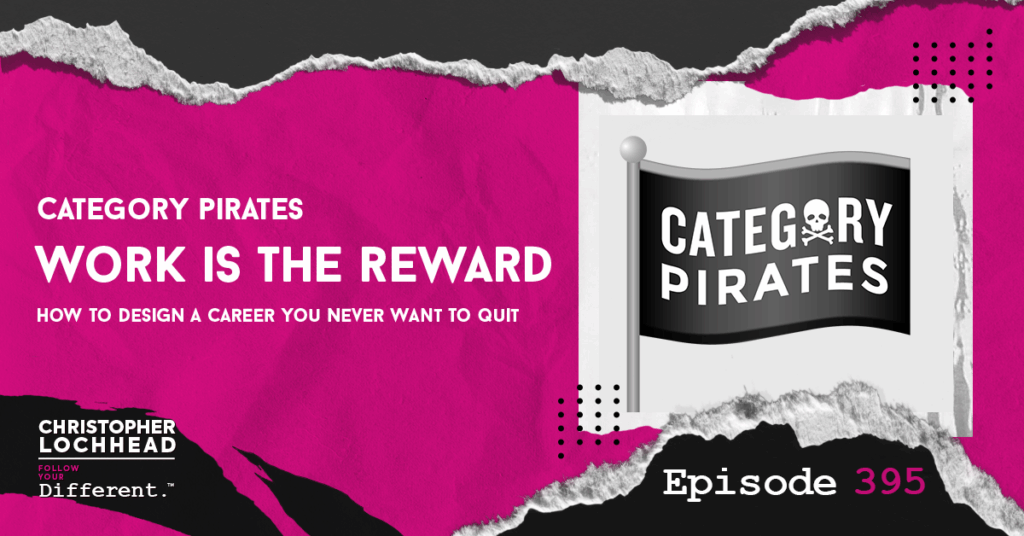
Podcast: Play in new window | Download (Duration: 50:33 — 34.7MB) | Embed
Subscribe: Apple Podcasts | Spotify | Pandora | RSS | More
On this episode of Christopher Lochhead: Follow Your Different, Christopher and his fellow Category Pirates explore the concept of retirement, challenging the traditional notion that it is the ultimate goal of one’s career. Instead, they advocate for a paradigm shift, suggesting that work can be a source of meaning, freedom, and joy.
They discuss the “big retirement lie,” advocating for a life and career one doesn’t want to retire from. Eddie shares his view of retirement as a “runway” for continued growth. The Pirates collectively emphasize the importance of meaningful work and encourage everyone to design careers that align with their passions, making work a rewarding aspect of life.
You’re listening to Christopher Lochhead: Follow Your Different. We are the real dialogue podcast for people with a different mind. So get your mind in a different place, and hey ho, let’s go.
The Concept of Retirement
Christopher sets the stage by inviting listeners to explore what he calls the “big retirement lie.” He challenges the conventional wisdom that retirement is the golden pot at the end of a long work journey. Instead, he suggests that work can be a source of fulfillment and joy, rather than something to escape from.
He cites examples of individuals like Mick Jagger and Dolly Parton, who continue to work and find meaning in their careers well into their later years. The conversation aims to inspire listeners to rethink their relationship with work and consider how they can design a life that integrates work as a rewarding aspect rather than a burdensome obligation.
The “Big Retirement Lie”
Katrina expands on the idea of the “big retirement lie.” She argues that the conventional wisdom of working hard, saving money, and then retiring to enjoy life is flawed. Instead, she encourages listeners to consider how they can design their lives and careers in such a way that they never feel the need to retire. This perspective shifts the focus from a future escape to a present engagement with work that brings joy and satisfaction.
Eddie shares his personal journey and insights regarding retirement. He describes retirement not as a final destination but as a “runway” that allows for continued growth and exploration. He reflects on his own experiences, noting that he has retired multiple times, only to find himself drawn back into work that he loves. Eddie emphasizes that the idea of retirement as a permanent stop is misleading; instead, he views it as a layover on a journey filled with opportunities for new adventures.
The Importance of Meaningful Work
Eddie discusses the significance of meaningful work, arguing that the pursuit of financial freedom should not overshadow the desire for a fulfilling career. He believes that having a financial runway, like sufficient resources to explore new opportunities. can empower individuals to take risks and pursue their passions without the fear of financial instability.
Eddie also touches on the idea of serendipity in career paths. He shares how unexpected opportunities can arise when individuals remain open to new experiences and collaborations. This mindset fosters a sense of adventure and exploration, allowing for personal and professional growth.
To hear more about the Pirate’s Perspectives on Retirement and doing meaningful work, download and listen to this episode.
Subscribe to Category Pirates today and join the crew in our Category Design journey on the business seas!
Don’t forget to grab a copy (or gift!) of one of our best-selling books:
Snow Leopard: How Legendary Writers Create A Category Of One
The Category Design Toolkit: Beyond Marketing: 15 Frameworks For Creating & Dominating Your Niche
A Marketer’s Guide To Category Design: How To Escape The “Better” Trap, Dam The Demand, And Launch A Lightning Strike Strategy
 The 22 Laws of Category Design: Name & Claim Your Niche, Share Your POV, And Move The World From Where It Is To Somewhere Different
The 22 Laws of Category Design: Name & Claim Your Niche, Share Your POV, And Move The World From Where It Is To Somewhere Different**NEW!** The B2B Tech Marketer’s Guide To Category Design: How To Engineer Your Market, Find What Makes You Different, And Become A Category Queen
We hope you enjoyed this episode of Christopher Lochhead: Follow Your Different™! Christopher loves hearing from his listeners. Feel free to email him, connect on Facebook, Twitter, Instagram, and subscribe on iTunes!
394 Radical Listening: The Superpower Hiding in Plain Sight with Dr. Christian van Nieuwerburgh & Dr. Robert Biswas-Diener
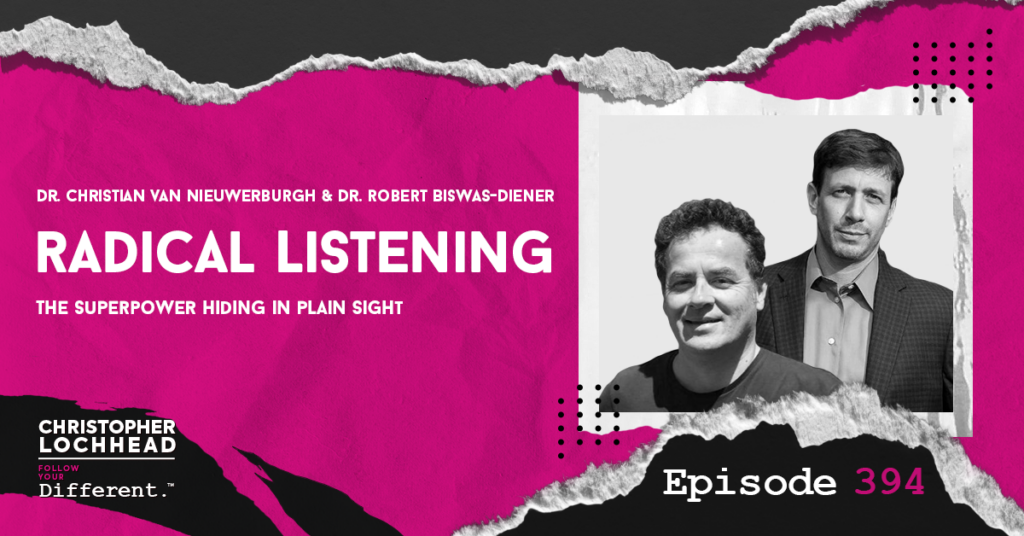
Podcast: Play in new window | Download (Duration: 1:27:55 — 60.4MB) | Embed
Subscribe: Apple Podcasts | Spotify | Pandora | RSS | More
On this episode of Christopher Lochhead: Follow Your Different, we engage with psychologists Dr. Christian van Nieuwerburgh and Dr. Robert Biswas-Diener to explore the concept of radical listening.
We discuss why effective listening is challenging in today’s fast-paced, technology-driven world and identify cultural and emotional barriers that hinder genuine communication. We’ll also highlight how radical listening can transform personal and professional relationships by making others feel seen, valued, and heard through active curiosity and empathy.
This episode serves as a call to action for listeners to cultivate deeper connections through intentional and empathetic listening practices.
You’re listening to Christopher Lochhead: Follow Your Different. We are the real dialogue podcast for people with a different mind. So get your mind in a different place, and hey ho, let’s go.
Introduction to Radical Listening
Christopher sets the stage by introducing his esteemed guests, Dr. Christian van Nieuwerburgh and Dr. Robert Biswas-Diener. He poses them a critical question: why do so many people struggle with listening effectively? This question serves as the foundation for a deep dive into the nuances of listening and its impact on human connection.
Dr. van Nieuwerburgh begins by highlighting a paradox: despite being born with the ability to hear, many individuals fail to listen well. He attributes this to several factors: our current fast-paced modern lifestyles, technological distractions, and each person’s internal emotional barriers.
Dr. Biswas-Diener adds that cultural dynamics play a significant role in shaping our listening habits. In Western societies, individualism often leads to conversations becoming competitions for airtime. People frequently listen with the intent to respond rather than to understand, resulting in superficial interactions. This “waiting to talk” mentality is a significant barrier to genuine listening.
The Importance of Curiosity
Chistopher shares his personal journey of self-discovery, emphasizing the importance of personal development in improving listening skills. He recalls a coach who taught him that what many people call listening is often just waiting for their turn to speak. This insight underscores the need for a shift in mindset.
Dr. van Nieuwerburgh agrees and adds that a key aspect of radical listening is approaching conversations with curiosity. When individuals genuinely seek to understand others, they create a space for deeper connection. This involves asking them open-ended questions, avoiding assumptions, and practicing patience and letting the other person finish their thoughts without interruption.
Cultural Influences on Listening
The conversation shifts to the impact of technology and social media on listening habits. Christopher points out that many platforms prioritize self-promotion and broadcasting over genuine interaction. This environment fosters a culture of “me first,” where individuals are more concerned with sharing their own experiences than engaging with others.
Christopher also reflects on the teachings of Stephen Covey, who emphasized the importance of seeking first to understand before being understood. He contrasts this with the current trend of self-centered communication, where individuals prioritize their own narratives over listening to others. Dr. Biswas-Diener acknowledges this shift and highlights the need for a rebranding of listening practices to emphasize connection rather than mere comprehension.
To hear more from Dr. Christian van Nieuwerburgh & Dr. Robert Biswas-Diener and how Listening can be a superpower in everyday life, download and listen to this episode.
Bio
Dr. Christian van Nieuwerburgh
Dr. Christian van Nieuwerburgh is a distinguished executive coach, academic, and consultant, renowned for his contributions to coaching and positive psychology. He currently serves as Professor of Coaching and Positive Psychology at the Centre for Positive Health Sciences at RCSI University of Medicine and Health Sciences in Ireland and is a Principal Fellow at the Centre for Wellbeing Science at the University of Melbourne. Additionally, he holds the position of Consulting Professor, supporting Growth Coaching International and the Instructional Coaching Group.
Dr. van Nieuwerburgh has authored and edited numerous influential works in the field, including “An Introduction to Coaching Skills: A Practical Guide” and “Coaching in Education: Getting Better Results for Students, Educators and Parents.” His research interests encompass intercultural coaching, the creation of coaching cultures, and the integration of coaching within educational settings. He is also the editor-in-chief of “Coaching: An International Journal of Theory, Research and Practice.”
Passionate about fostering positive learning environments, Dr. van Nieuwerburgh collaborates with educational institutions worldwide to implement coaching initiatives. His work emphasizes the transformative power of coaching in education, aiming to enhance outcomes for students, educators, and parents alike.
Dr. Robert Biswas-Diener
Dr. Robert Biswas-Diener is a psychologist, researcher, and author renowned for his work in positive psychology. Dubbed the “Indiana Jones of Positive Psychology,” he has conducted research on happiness and well-being among diverse groups, including the Amish, Inuit, and Maasai.
He has authored over 75 peer-reviewed articles and multiple books, such as “Positive Provocation” (2023) and “The Upside of Your Dark Side” (2014). His research focuses on topics like happiness, strengths, and leadership.
As an executive coach and trainer, Dr. Biswas-Diener has worked with organizations worldwide, including Deloitte and the Australia Department of Defense. In 2024, Thinkers50 recognized him as one of the 50 most influential executive coaches globally.
Links
Connect with Dr. Christian van Nieuwerburgh & Dr. Robert Biswas-Diener!
Dr. Robert Biswas-Diener
LinkedIn | Website
Dr. Christian van Nieuwerburgh
LinkedIn | X (formerly Twitter)
We hope you enjoyed this episode of Christopher Lochhead: Follow Your Different™! Christopher loves hearing from his listeners. Feel free to email him, connect on Facebook, Twitter, Instagram, and subscribe on iTunes!
393 You Don’t Need Credentials To Create: How To Scale (And Get Paid) For What You Know | Category Pirates

Podcast: Play in new window | Download (Duration: 1:03:56 — 43.9MB) | Embed
Subscribe: Apple Podcasts | Spotify | Pandora | RSS | More
On this episode of Christopher Lochhead: Follow Your Different, we explore the transformative potential of intellectual capital (IC) with our fellow Pirate Eddie Yoon. Intellectual Capital (IC) is a valuable yet often overlooked asset, which can help you to shift from being knowledge workers to creator capitalists.
We also discuss the challenges of making complex ideas accessible and highlights the importance of diagnostics in leveraging IC, and go into the concept of “lenses,” or perspectives, that can illuminate new opportunities. This episode serves as a call to action for individuals to recognize and monetize their unique knowledge, fostering innovation and personal growth.
You’re listening to Christopher Lochhead: Follow Your Different. We are the real dialogue podcast for people with a different mind. So get your mind in a different place, and hey ho, let’s go.
The Essence of Intellectual Capital
Christopher opens the discussion by talking about how intellectual capital is often an underappreciated asset. Intellectual capital is not just for academics or certified experts; it is an asset that everyone possesses. Many individuals possess a wealth of knowledge accumulated over their careers, yet they fail to recognize its potential value. The key is understanding how to package and monetize this knowledge effectively.
Eddie Yoon elaborates on this point, discussing the transition from being a knowledge worker to becoming a creator capitalist. A knowledge worker typically replicates existing knowledge, while a creator capitalist actively creates new knowledge and value. This shift is crucial in a rapidly changing job market, especially with the rise of artificial intelligence and automation, which threatens many traditional jobs.
The Importance of Diagnostics
Another key point in their discussion is the role of diagnostics in understanding and leveraging intellectual capital. Eddie Yoon notes that many industries, particularly healthcare and fitness, utilize diagnostic tests to establish baselines and measure progress. He argues that this practice should be more widely adopted in other fields, including consulting and sales.
Eddie cites the historical context of management consulting, referencing Marvin Bower and James O. McKinsey, who emphasized the importance of accounting as a diagnostic tool for financial health. Just as doctors assess patients’ health through tests, businesses should evaluate their performance through similar diagnostics to identify areas for improvement.
The Power of Lenses
The conversation then shifts to the concept of “lenses”—the perspectives through which we view our ideas and experiences. Eddie Yoon reflects on how writing and teaching have helped him develop a clearer understanding of category design, a concept he believes is crucial for business success.
Christopher adds to this by discussing the various types of lenses we encounter in life, using the metaphor of prescription glasses. Just as different lenses can enhance our vision, new perspectives can illuminate previously unseen opportunities. He likens this to using a microscope or telescope, which allows us to see details or distant objects that are otherwise obscured.
To hear more from the Category Pirates and their thoughts on Intellectual Capital, download and listen to this episode.
Subscribe to Category Pirates today and join the crew in our Category Design journey on the business seas!
Don’t forget to grab a copy (or gift!) of one of our best-selling books:
Snow Leopard: How Legendary Writers Create A Category Of One
The Category Design Toolkit: Beyond Marketing: 15 Frameworks For Creating & Dominating Your Niche
A Marketer’s Guide To Category Design: How To Escape The “Better” Trap, Dam The Demand, And Launch A Lightning Strike Strategy
 The 22 Laws of Category Design: Name & Claim Your Niche, Share Your POV, And Move The World From Where It Is To Somewhere Different
The 22 Laws of Category Design: Name & Claim Your Niche, Share Your POV, And Move The World From Where It Is To Somewhere Different**NEW!** The B2B Tech Marketer’s Guide To Category Design: How To Engineer Your Market, Find What Makes You Different, And Become A Category Queen
We hope you enjoyed this episode of Christopher Lochhead: Follow Your Different™! Christopher loves hearing from his listeners. Feel free to email him, connect on Facebook, Twitter, Instagram, and subscribe on iTunes!
392 All Business Is Personal: Why Relationship Capital Is The Most Underestimated Form Of Wealth | Category Pirates

Podcast: Play in new window | Download (Duration: 58:38 — 40.3MB) | Embed
Subscribe: Apple Podcasts | Spotify | Pandora | RSS | More
On this episode of Christopher Lochhead: Follow Your Different, we get a fresh Pirates Perspective with our favorite fellow Category Pirates Eddie Yoon and Katrina Kirsch on why Relationship Capital is the most underrated form of wealth.
In business, success is often attributed to strategy, skill, and spreadsheets. But the truth is, it’s deeply personal. The strongest careers and ventures are built not just on solo efforts but on shared battles, purpose, and risks. This is where Relationship Capital comes into play—an intangible but invaluable form of wealth that defines long-term success.
You’re listening to Christopher Lochhead: Follow Your Different. We are the real dialogue podcast for people with a different mind. So get your mind in a different place, and hey ho, let’s go.
Business is Radically Personal
Many people believe that business is purely transactional, but the truth is that all business is personal. The deals you close and the partnerships you build are deeply rooted in human connections. It’s not just about numbers; it’s about trust and loyalty.
Legendary careers are built not just on talent or hard work but on meaningful relationships. By investing genuinely in people, you create alliances that stand the test of time and challenges. When people trust you, they are more likely to go to battle with you and for you.
Shared Purpose Builds Unbreakable Bonds
Relationships that transcend transactions are grounded in shared purpose. When people come together for a common cause, the bonds formed are unbreakable. This shared vision fosters trust, collaboration, and loyalty.
Whether you’re launching a startup or leading a team, aligning on purpose ensures everyone moves in the same direction. It also brings people of diverse backgrounds together, united by a mission that goes beyond personal gain. This is the foundation of long-lasting, impactful connections.
Risk and Reward in Relationship Capital
Building deep connections requires vulnerability and risk. Genuine relationships are built when people stand by each other during challenges. This emotional investment may not always yield immediate results, but it leads to exponential rewards over time.
Those who take risks in relationships—whether by showing support during failures or celebrating successes—create bonds that are resilient and meaningful. In the end, it’s not the number of LinkedIn connections that matters but the people who stand by you when it counts.
To hear more from the Category Pirates and their thoughts on Relationship Capital, download and listen to this episode.
Subscribe to Category Pirates today and join the crew in our Category Design journey on the business seas!
Don’t forget to grab a copy (or gift!) of one of our best-selling books:
Snow Leopard: How Legendary Writers Create A Category Of One
The Category Design Toolkit: Beyond Marketing: 15 Frameworks For Creating & Dominating Your Niche
A Marketer’s Guide To Category Design: How To Escape The “Better” Trap, Dam The Demand, And Launch A Lightning Strike Strategy
 The 22 Laws of Category Design: Name & Claim Your Niche, Share Your POV, And Move The World From Where It Is To Somewhere Different
The 22 Laws of Category Design: Name & Claim Your Niche, Share Your POV, And Move The World From Where It Is To Somewhere Different**NEW!** The B2B Tech Marketer’s Guide To Category Design: How To Engineer Your Market, Find What Makes You Different, And Become A Category Queen
We hope you enjoyed this episode of Christopher Lochhead: Follow Your Different™! Christopher loves hearing from his listeners. Feel free to email him, connect on Facebook, Twitter, Instagram, and subscribe on iTunes!
391 Solving Climate Change with Capitalism: How Andrew Gilmour Is Unlocking Trillions in Carbon Markets
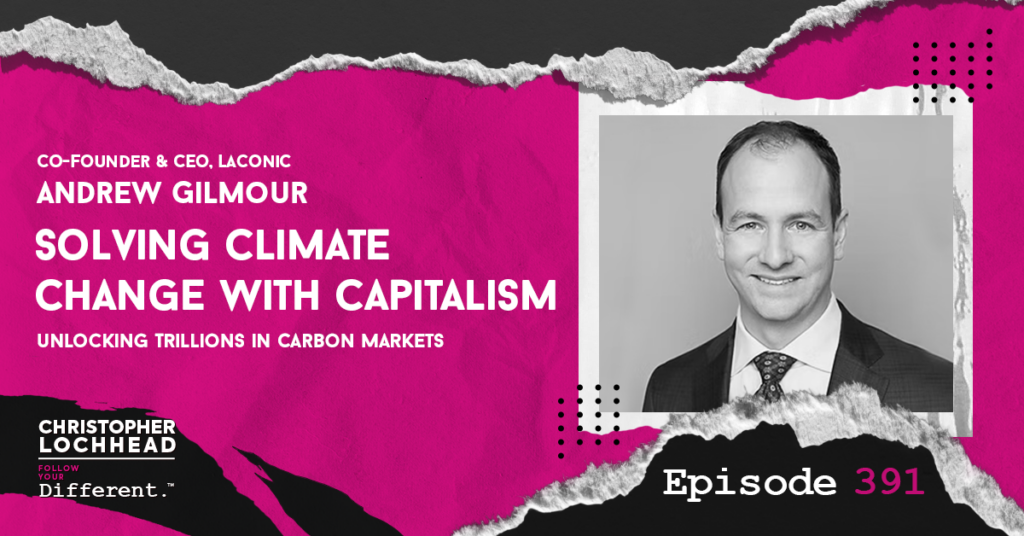
Podcast: Play in new window | Download (Duration: 1:27:25 — 60.0MB) | Embed
Subscribe: Apple Podcasts | Spotify | Pandora | RSS | More
On this episode of Christopher Lochhead: Follow Your Different, Andrew Gilmour, a visionary entrepreneur, discussed how capital markets can transform the way we approach environmental sustainability.
The global carbon market is a trillion-dollar opportunity waiting to be realized, yet it remains inefficient and fragmented. By leveraging financial innovation, Andrew Gilmour believes we can create scalable, investable assets that will not only fight climate change but also generate wealth for developing nations.
His insights shed light on the current barriers, the revolutionary potential of financial instruments, and why bold action is necessary to disrupt the status quo.
You’re listening to Christopher Lochhead: Follow Your Different. We are the real dialogue podcast for people with a different mind. So get your mind in a different place, and hey ho, let’s go.
Andrew Gilmour on the Broken State of Carbon Markets
Carbon credits were originally designed as a solution to global emissions, allowing companies and governments to offset their carbon footprint by investing in environmental preservation. However, as Gilmour explains, the current system is deeply flawed. The voluntary carbon market, which should be a powerful tool for change, is dramatically undersized. In 2024, it only accounted for about $3 billion in trade volume, a minuscule amount compared to the estimated $4-5 trillion in annual demand.
One key reason for this inefficiency is the absence of liquidity. Unlike traditional stocks or commodities, carbon credits are not structured as financial instruments that can be easily bought, sold, or held as assets. Many companies treat them as a charitable expense rather than a tradable commodity, further limiting the market’s potential. Andrew argues that to unlock real value, we must introduce market structures that allow investors to buy, hold, and even short carbon credits—just as they would with any other financial asset.
A Capital Market’s Approach to Environmental Change
Andrew Gilmour believes that the only way to make carbon markets work is to integrate them into the global financial system. By structuring carbon credits as assets with clear ownership, transparency, and liquidity, the market can become attractive to a wider range of investors.
“The beauty of capital markets is that they harness enlightened self-interest. It’s not for the benevolence of the butcher, the baker, or the brewer that we owe our daily bread, but to their own self-interest.”
— Andrew Gilmour
His approach has already yielded groundbreaking results. In a deal with Bolivia, $5 billion worth of carbon assets were structured and made available for trade, equivalent to 11% of the country’s GDP. This transaction not only helps reduce emissions but also creates an economic lifeline for developing nations. Through financial innovation, Andrew is proving that environmental sustainability and economic growth are not mutually exclusive.
Andrew Gilmour on the Path Forward: Disrupting the Status Quo
For decades, climate action has been largely dominated by NGOs and government initiatives. Although they are well-intentioned, these efforts have failed to create scalable solutions. Andrew argues that the key to meaningful change lies in disrupting the existing model and adopting a fully market-driven approach.
His vision for the future includes turning forests, kelp beds, and other natural carbon sinks into structured financial assets. By leveraging AI, satellite data, and advanced trading mechanisms, he is building a platform that ensures transparency and accountability in carbon trading. This approach not only benefits the environment but also attracts investors who might not have previously considered sustainability as a viable financial opportunity.
As the world moves toward a net-zero future, the need for innovative, market-based solutions has never been greater. Andrew Gilmour’s bold vision challenges conventional thinking, proving that financial markets have the power to drive environmental change at an unprecedented scale.
To hear more from Andrew Gilmour and how to unlock trillions in the Carbon Markets, download and listen to this episode.
Bio
Andrew Gilmour is the Co-founder & CEO of Laconic, a pioneering company revolutionizing carbon markets through financial innovation. With a background in capital markets and data-driven solutions, he is transforming carbon credits into tradable assets, unlocking trillions in environmental investments.
Under his leadership, Laconic utilizes AI, satellite data, and regulatory frameworks to bring trust, transparency, and liquidity to carbon trading. His groundbreaking work has already led to billion-dollar deals, proving that sustainability and profitability can coexist.
A visionary entrepreneur, Andrew Gilmour is redefining how financial markets drive global climate action and economic growth.
Links
We hope you enjoyed this episode of Christopher Lochhead: Follow Your Different™! Christopher loves hearing from his listeners. Feel free to email him, connect on Facebook, Twitter, Instagram, and subscribe on iTunes!
390 Design Your Future: How To Trade Fear For A Fulfilling Career | Category Pirates

Podcast: Play in new window | Download (Duration: 42:10 — 29.0MB) | Embed
Subscribe: Apple Podcasts | Spotify | Pandora | RSS | More
On this episode of Christopher Lochhead: Follow Your Different, we get a Pirates Perspective with our favorite fellow Category Pirates Eddie Yoon and Katrina Kirsch on how personal capital—financial resources, reputation, creativity, and relationships—can empower individuals to design a career and life on their own terms.
Many people wake up every day working for someone else’s dream, relying on a paycheck while wondering, “Is this all there is?” The truth is, breaking free from this cycle requires more than just ambition—it takes Personal Capital. We hope that this episode helps fellow Pirates see how they can build up their personal capital rather than mindlessly selling their time for money.
You’re listening to Christopher Lochhead: Follow Your Different. We are the real dialogue podcast for people with a different mind. So get your mind in a different place, and hey ho, let’s go.
The Four Types of Personal Capital
To build a career that provides true freedom, you need more than just money. The four types of personal capital include:
- Financial Capital – Savings, investments, and income sources that give you the flexibility to take risks and invest in yourself.
- Reputation Capital – Your personal brand, expertise, and credibility that open doors to new opportunities.
- Creator Capital – The ability to generate unique ideas and create scalable value, especially in a digital-first world.
- Relationship Capital – A strong network of mentors, collaborators, and supporters who propel you forward.
The hosts discuss that understanding and investing in these four areas allows individuals to shift from merely selling their time for money to leveraging their skills and resources for long-term independence.
The Emotional Journey of Breaking Free
Leaving behind a traditional career path is not just a financial challenge—it’s an emotional one. Fear, self-doubt, and the weight of societal expectations can make this transition overwhelming.
Each of the hosts then share their journey from restarting again to launching a successful business despite having no money or connections and the uncertainty of success.
Entrepreneurs and career changers often grapple with fear of failure and imposter syndrome. However, taking control of one’s career means embracing the discomfort of uncertainty and learning from failures rather than fearing them. The key is to develop radical agency—the mindset that you are the author of your own future.
Adapting to the Changing Work Landscape
The hosts then get to the topic of AI. The digital revolution, particularly the rise of AI and automation, is reshaping how we work. Traditional knowledge-based careers are being disrupted as AI makes existing information more accessible and commoditized. The new competitive edge lies in creative and entrepreneurial thinking.
All three agree that in order to thrive in this evolving landscape, professionals must learn to shift from knowledge work to creator work, producing unique and scalable value. One must also leverage digital tools and platforms to build their brand and reach a global audience. And finally, one must continuously learn and reinvent themselves to stay ahead of industry shifts.
The key takeaway? Now is the best time to embrace digital opportunities and take control of your career. Those who do will find greater flexibility, fulfillment, and financial independence.
To hear more from the Category Pirates and their thoughts on personal capital, download and listen to this episode.
If you wish to listen to the Personal Capital audiobook, subscribe to Category Pirates so you can have access to their multitude of audio books that is available for every pirate to hear. You can also join in the discussions to add your thoughts about Category Design, brands, and sailing the business seas!
Don’t forget to grab a copy (or gift!) of one of our best-selling books:
Snow Leopard: How Legendary Writers Create A Category Of One
The Category Design Toolkit: Beyond Marketing: 15 Frameworks For Creating & Dominating Your Niche
A Marketer’s Guide To Category Design: How To Escape The “Better” Trap, Dam The Demand, And Launch A Lightning Strike Strategy
 The 22 Laws of Category Design: Name & Claim Your Niche, Share Your POV, And Move The World From Where It Is To Somewhere Different
The 22 Laws of Category Design: Name & Claim Your Niche, Share Your POV, And Move The World From Where It Is To Somewhere Different**NEW!** The B2B Tech Marketer’s Guide To Category Design: How To Engineer Your Market, Find What Makes You Different, And Become A Category Queen
We hope you enjoyed this episode of Christopher Lochhead: Follow Your Different™! Christopher loves hearing from his listeners. Feel free to email him, connect on Facebook, Twitter, Instagram, and subscribe on iTunes!
389 Leading with Love and Resistance: Pastor Evan Mawarire on Freedom, Democracy, and the Power of Faith
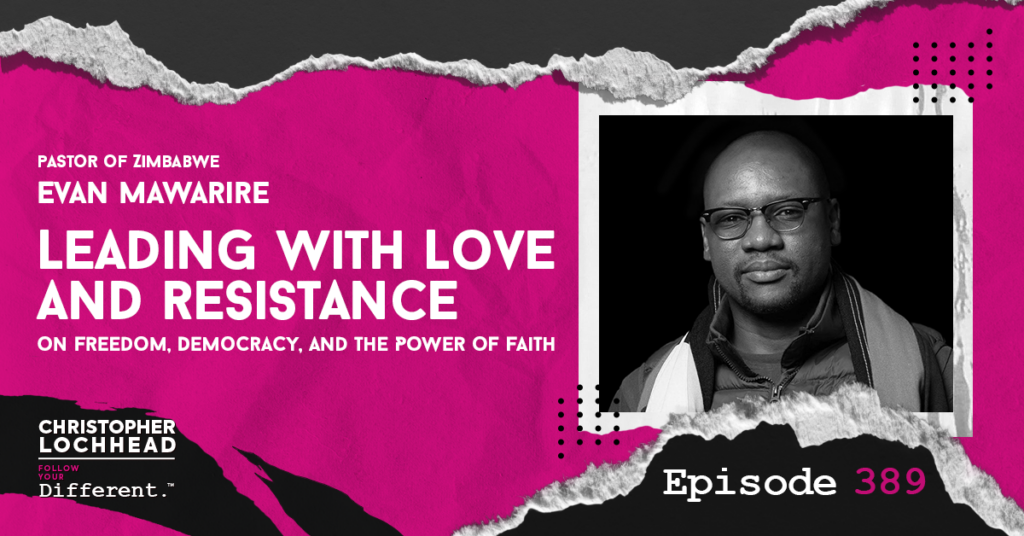
Podcast: Play in new window | Download (Duration: 1:48:53 — 74.8MB) | Embed
Subscribe: Apple Podcasts | Spotify | Pandora | RSS | More
On this episode of Christopher Lochhead: Follow Your Different, Pastor Evan Mawarire joins us in an insightful conversation about the complexities of faith, the pursuit of happiness, and the importance of re-evaluating our core values.
Pastor Evan Mawarire’s journey is a testament to the power of courage, faith, and resilience in overcoming adversity. From his humble beginnings to becoming a voice of hope for millions, his story reflects the transformative power of self-belief and the pursuit of a higher purpose. In a candid conversation, Pastor Mawarire shares the lessons he learned during his darkest hours and how they shaped his vision of life and faith.
You’re listening to Christopher Lochhead: Follow Your Different. We are the real dialogue podcast for people with a different mind. So get your mind in a different place, and hey ho, let’s go.
Pastor Evan Mawarire on the Courage to Defy Social Norms
Pastor Evan’s journey highlights the importance of stepping outside the molds imposed by societal norms. Reflecting on how society often dictates expectations, he shares how breaking free from these conventions unlocked opportunities and insights he could never have imagined.
“Once I broke that, I started seeing things I could never have seen no matter how much money I had paid.”
– Pastor Evan Mawarire
This defiance wasn’t about rebellion for its own sake but rather a quest for authenticity and self-discovery. His story reminds us that courage lies in questioning long-standing beliefs and seeking our own truth, even when it challenges conventional wisdom.
The Power of Mental Scaffolding
In a powerful metaphor, Pastor Evan compares the structures of our thinking to scaffolding—a temporary framework essential for building something greater. He emphasizes how reshaping our mental scaffolding can transform our relationship with reality.
Whether in personal growth or societal movements, the way we perceive and articulate our struggles determines our capacity to overcome them. Pastor Evan’s insights serve as a reminder that redefining our mental frameworks is key to achieving greatness.
The Unsure Journey Back to Faith
For those curious about faith or feeling disconnected, Pastor Evan offers an inclusive perspective. He acknowledges the doubt and uncertainty many feel when exploring spirituality. “Jesus just loves people with doubt,” he affirms.
Drawing from his experiences, including moments of despair in maximum-security prison, he highlights how vulnerability and honesty can pave the way to spiritual connection. His message is clear: the journey back to faith doesn’t require perfection or certainty—just a willingness to knock on the door. By embracing doubt and curiosity, anyone can begin to uncover a deeper sense of purpose and belonging.
To hear more from Pastor Evan Mawarire and how to lead with love and resistance, download and listen to this episode.
Bio
Evan Mawarire is a Zimbabwean clergyman who founded #ThisFlag Citizen’s Movement to challenge corruption, injustice, and poverty in Zimbabwe.
The movement empowers citizens to hold government to account. Through viral videos, the movement has organized multiple successful non-violent protests in response to unjust government policy.
Pastor Evan was imprisoned in 2016, 2017, and 2019 for charges of treason, facing 80 years in prison.
His message of inspiring positive social change and national pride has resonated with diverse groups of citizens and attracted international attention.
Pastor Evan has addressed audiences around the world, and Foreign Policy magazine named him one of the 100 global thinkers of 2016.
The Daily Maverick Newspaper of South Africa named him 2016 African person of the year.
Evan is a 2018 Stanford University Fellow of the Centre for Democracy Development and the Rule of Law.
Links
Connect with Pastor Evan Mawarire!
Renew Democracy Initiative | Twitter | Instagram | Facebook
More information about Pastor Evan Mawarire
2022/23 SNF Agora Institute Johns Hopkins University Visiting Fellow
2022 National Endowment for Democracy Regan Fascell Fellow
2020 Yale University World Fellow
Yale International Leadership Centre advisory council member
We hope you enjoyed this episode of Christopher Lochhead: Follow Your Different™! Christopher loves hearing from his listeners. Feel free to email him, connect on Facebook, Twitter, Instagram, and subscribe on iTunes!
388 The Empty Chair: A Different Approach to Grief This Holiday Season | Category Pirates
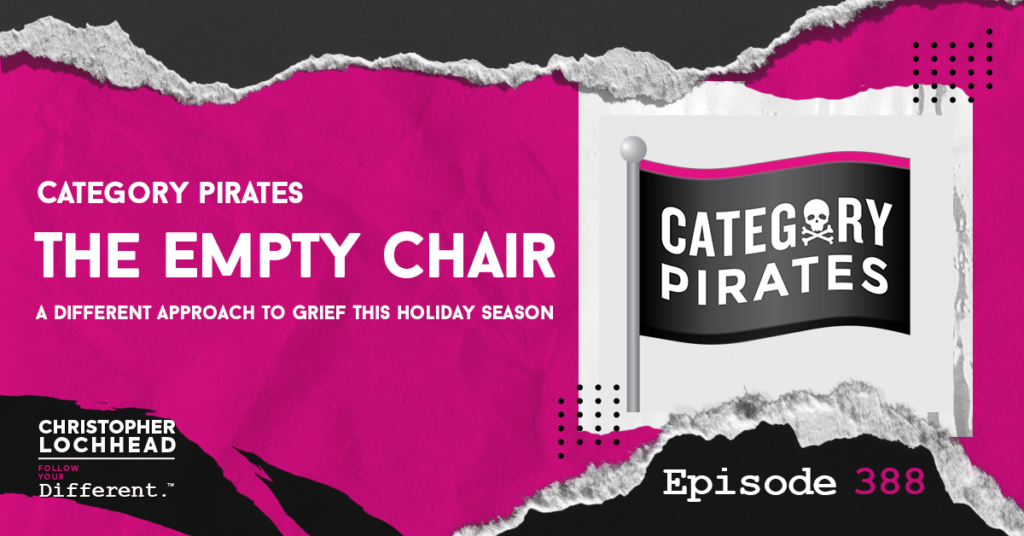
Podcast: Play in new window | Download (Duration: 31:39 — 21.7MB) | Embed
Subscribe: Apple Podcasts | Spotify | Pandora | RSS | More
On this episode of Christopher Lochhead: Follow Your Different, Christopher shares his personal journey through grief following the tragic murder of his close friend, Tushar.
Joined by fellow Category Pirates Eddie Yoon and Katrina Kirsch, they explore the metaphor of the “empty chair” to symbolize the ongoing presence of loss. Eddie discusses Grief Design, advocating for radical self-expression and community support. Katrina emphasizes the universality of loss and the importance of open conversations about grief.
Together, they offer insights on navigating grief, balancing pain with joy, and the transformative power of community support.
You’re listening to Christopher Lochhead: Follow Your Different. We are the real dialogue podcast for people with a different mind. So get your mind in a different place, and hey ho, let’s go.
The Empty Chair
Christopher introduces the metaphor of the “empty chair” to symbolize the ongoing presence of grief in our lives. This empty chair represents those we have lost, serving as a poignant reminder of their absence while also opening up a space for reflection and conversation about our experiences with loss.
Acknowledging the empty chair is the first step towards healing, and creating a physical space, such as a small memorial in your home, can serve as a tangible reminder and a place for reflection.
Grief Design
Eddie Yoon presents the concept of Grief Design, emphasizing the importance of actively engaging with our grief rather than allowing it to consume us. By framing our grief, we can express our anger and pain without resorting to violence or despair. Finding safe outlets for emotions, whether through writing, art, or physical activities, can aid in processing grief.
Additionally, surrounding oneself with a supportive network of friends, family, and professionals is crucial. This support system helps navigate the tumultuous waters of grief, allowing for a deeper understanding of oneself and relationships.
Creating Spaces and Opening Conversations for Grief
Katrina Kirsch underscores the universality of loss and the importance of creating spaces for open and empathetic conversations about grief.
Christopher shares his journey of learning to coexist with grief while seeking joy, highlighting the possibility of experiencing joy in the face of pain. Allowing dual emotions to coexist harmoniously is essential, and engaging in activities that bring joy, even if they are small, can help balance the emotional landscape. Christopher also touches on the role of faith in navigating grief, sharing a moment of vulnerability when he reached out to a higher power for support. Faith, whether through organized religion or personal spirituality, can provide comfort and strength during difficult times.
To hear more about Grief Design and how you can help someone who is currently in need of support, download and listen to this episode.
Want to join in on the Pirate Talks? Subscribe to Category Pirates and sail the seas with fellow Pirates today!
Don’t forget to grab a copy (or gift!) of one of our best-selling books:
Snow Leopard: How Legendary Writers Create A Category Of One
The Category Design Toolkit: Beyond Marketing: 15 Frameworks For Creating & Dominating Your Niche
A Marketer’s Guide To Category Design: How To Escape The “Better” Trap, Dam The Demand, And Launch A Lightning Strike Strategy
 The 22 Laws of Category Design: Name & Claim Your Niche, Share Your POV, And Move The World From Where It Is To Somewhere Different
The 22 Laws of Category Design: Name & Claim Your Niche, Share Your POV, And Move The World From Where It Is To Somewhere Different**NEW!** The B2B Tech Marketer’s Guide To Category Design: How To Engineer Your Market, Find What Makes You Different, And Become A Category Queen
We hope you enjoyed this episode of Christopher Lochhead: Follow Your Different™! Christopher loves hearing from his listeners. Feel free to email him, connect on Facebook, Twitter, Instagram, and subscribe on iTunes!

